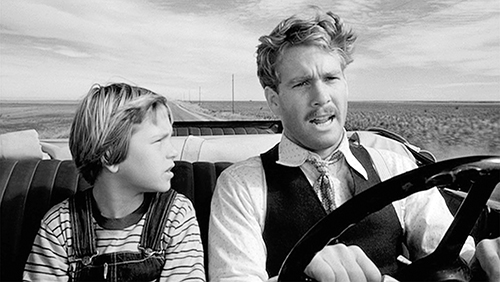Bible swindlers, whiskey smugglers and “wrastlin’” to settle differences are just some of the colorful Great Depression peculiarities portrayed in Paper Moon, the 1973 classic that’s playing at Portland State’s 5th Avenue Cinema this weekend.
Like father, like daughter

Bible swindlers, whiskey smugglers and “wrastlin’” to settle differences are just some of the colorful Great Depression peculiarities portrayed in Paper Moon, the 1973 classic that’s playing at Portland State’s 5th Avenue Cinema this weekend.
Tatum O’Neal made her acting debut in Paper Moon in the lead role of Addie Loggins, a young, sharp, intuitive orphan whom we first meet at her mother’s funeral.
She soon gets caught up with a former friend of her mother’s, a con man named Moze who’s played by her real-life father, Ryan O’Neal, when he presents flowers just snatched from a nearby grave.
Moze’s conscience makes him agree to take
Addie across state lines to Missouri so she can live with her aunt and uncle. Almost immediately after, the grifter cons $200 out of a man who knew the mother, and Moze blames him for her death.
Addie overhears this conversation and, after Moze has spent about half the cash, demands that she is entitled to the money, paid in full, or she’ll go to the police.
This is how Moze starts doing business with a 9-year-old.
The policeman is the natural enemy of the con artist. Moze’s eyes grow wide and his skin grows pale, and he does everything in his power to avoid a confrontation. There are a number of scenes in which Moze and law enforcement share the screen, and each scene is more intimidating than the last.
I was only watching this movie—not swindling or bootlegging—and I was tense.
Time and again the movie demonstrates the dangers of being naive, or at least, it provides a playbook on how to take advantage of naive folks. Addie is only 9 years old, yet she’s already learned the delicate art of observation and application, and not in a good way.
She has learned how to gauge a person’s reaction based on his demeanor, behavior or dress. She then uses that information to essentially steal that person’s money.
The ironic part about their shenanigans? Later in the movie, after Moze is deceived by a foxy lady, he tells Addie, “When you grow up, don’t you be the kind of woman who goes around deceiving men.”
Little does he realize that she’s already that kind of girl, just without the romantically deceptive intentions.
Several times throughout the film, it’s hinted that Moze could be Addie’s father, on account of their similar jaws. It’s entertaining to see how they act together, how their relationship matures and how his mannerisms and lifestyle rub off on her.
But unless it were explicitly brought up in conversation, his potential fatherhood does not affect the plot.
This isn’t a movie about a child trying to reconnect with her estranged father; this is a movie about business. Even though t:ere are 20 years between the two, they are business partners and it is fairly easy to forget they’re not just two buddies out to make a few bucks.
Even when she throws her tantrums, Addie is treated like an adult: She smokes cigarettes, and Moze just plays it off like she’s an adult who knows what she’s doing.
If Addie’s innocent exploitation didn’t play a crucial role in the film’s plot, I would be convinced that her part was written for someone older and that Tatum O’Neal came strutting in and made the director, Peter Bogdanovich, change the character description.
She plays the role with such confidence and sass that it’s almost unbelievable she could pull this off at 10, when most of us could barely read the script.
Tatum O’Neal maintains the record for youngest actress (at the tender age of 10) to win an Academy Award. She earned it, too: The role of Addie is strong and Oscar-worthy. Strong characters call for even stronger actors to harness such power.
The only disappointment is the fact that O’Neal hit her peak in her very first role, as so often happens with child actors. She went on to do Bad News Bears, followed by a few small movie roles, followed by TV.
The film’s ending reminded me of Little Miss Sunshine. Granted, Paper Moon was released only a few years after the writer of Sunshine was born, but I hope the one was influenced by the other, at least in the end.
They both end on bittersweet notes: The main characters’ lives have been drastically altered, and Tatum O’Neal and Abigail Breslin both portray scrappy, often-underestimated young ladies (both were also nominated for a Best Supporting Actress award at age 10), and both movies include running after a moving car and trying to hop in.
A movie about life in the 1930s with the edge of 1970s cinema, Paper Moon shows the risk—and fun—of naive and manipulative characters.






